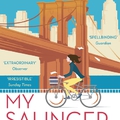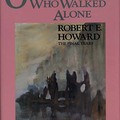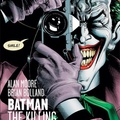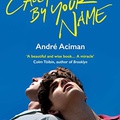Jennifer Egan: A Visit from the Goon Squad
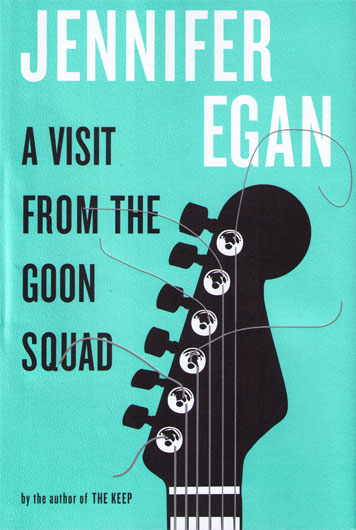
Jennifer Egan’s novel was a dream of a book for me: it's full of those wonderful, clever and witty postmodern games I adore and which I hardly ever find in a book in such a succinct and mature form, but besides all the postmodern games and the tricky literary details, A Visit from the Goon Squad is far from being a cool, rather soulless book in which form is more important than content and which you can only admire but cannot love.
Goon Squad is a novel made up of 13 interconnected short stories which can be read separately as well. It seems to me that it’s often claimed about novels made up of short stories that the stories are perfect in themselves but that you can grasp the whole picture and appreciate the individual stories’ worth more if you read them all – however, I have never tested the truthfulness of this claim so far. But now I had the chance to test it. One chapter of Goon Squad, „Out of Body” originally appeared as a short story in the 2011 edition of the Best American Short Stories series, and it was in that collection that I first came across this story. When I read „Out of Body” for the first time, I had no idea that it was part of a novel, but I was deeply fascinated and overwhelmed by the story so I immediately checked upon the author because I wanted to know more about the person who can write such unbelievably good stories. And this is how I found out about this novel, too.
I mentioned all these just to assure you: with Goon Squad, the claim cited above regarding novels-made-up-of-short-stories is definitely true. At least one chapter can be read as a perfectly free-standing work of art (and I guess you could read several chapters on their own, too – though probably not all of them), but if you read the book as a regular novel, you can find a mass of extra meanings and by reading chapters 100 or 200 pages apart, you can learn a lot of extra information about the characters far from one another both in time and space. And this makes the novel hugely enjoyable and also gives you the wonderful feeling of being an insider in the characters’ lives. (Again, let me mention „Out of Body”. When I first read that story I couldn’t really decide about the interpretation of the final scene. However, in Goon Squad, while reading a chapter set in a totally different time and space, among partly different characters, I learned about the fate of the protagonist of „Out of Body”.)
Still concerning the form and the way information is handled in the novel: it’s not my intention to list all the postmodern and/or unique features of the book, I just would like to mention a couple of them. One of these is the fact that each chapter is focused on a different character and each chapter is set at some point in the time between the end of the 1970s and the beginning of the 2020s, and the chapters usually don’t come in a chronological order. There are a couple of „real” protagonists in the novel who appear in almost all the chapters and whom we can see at several different turning points in their lives; but there are others who are first only minor characters in the chapter of one of the main characters, and then they have a separate chapter all to themselves. And the author sometimes asserts her omnipotence ironically by inserting small commentaries on certain characters and letting the reader know what their life would/had become in the following twenty or thirty years.
As regards the narrative techniques and other peculiar features of the novel: there are chapters told in the first person singular and chapters told in the third person singular; there’s a chapter which is like a PowerPoint presentation where you can read the „story” on little arrows, diagrams and callouts; and there’s a chapter („Out of Body”) written in the second person singular.
(Sounds complicated? Only in my review – reading the book, all this is perfectly easy to follow. However, I can’t help speaking about this, even though I can’t express myself with ease. Once I read in a review of Mark Z. Danielewski’s House of Leaves that one of the pleasures in writing about that book lies in the fact you simple desire to describe it. And it’s the same with Goon Squad. It’s immensely good simply to talk about it, and it doesn’t matter at all that I know I won’t be able to describe it adequately and I won’t be able to tell you why it’s so good that it’s exactly the way it is.)
Naturally, the question might arise: do all these less-than-ordinary formal details and narrative techniques mean anything in the book? Of course I don’t mind if strange visual, typographical or narrative techniques have no real meaning in a novel and they are just there because the author likes to play games and experiment with these things. However, if all these unique solutions actually mean something, then my enthusiasm and admiration know no limits. And to my great delight, in Goon Squad all these really mean something.
Let’s take a look az „Out of Body” again. The protagonist and narrator of this story is a mentally and emotionally shattered young man who attempted suicide a couple of months prior to the story’s present. Since his suicide attempt he often feels as if he were watching himself from the outside, but in the meantime he is also living his life „from the inside”. It would be possible to talk about the mental processes going on in this man in other ways as well, however, since the narrator is in and out at the same time, telling the story in the second person singular is an excellent and particularly effective choice because this way the narrator can address himself and see himself and make himself seen from the outside. What’s more, because of the peculiar mental state of the narrator, this narrative voice doesn’t sound forced – it’s absolutely natural. And the shift in the point of view in the final scene of the short story is simply breathtaking, so even if I had entertained any doubts about the meaningfulness of the second person singular narration (which I had not), the last sentence would have cleared all of them.
I mentioned at the beginning of my post that in this novel, form doesn’t become overwhelming and it doesn’t obscure meaning. However, so far I’ve only talked about the formal characteristics of the novel, so it’s time that I said something about the content as well. As you might guess from what I’ve written so far, the novel doesn’t have a regular, linear storyline, and we don’t get to know „everything” about the characters – not even about the main ones – and we learn a lot of important details only through a circuitous route, and we’re not actually present at a lot of important events. However, if I want to say something about the story, it would be this.
One of the main characters of the novel is Bennie Salazar, the owner of a record company. Bennie grew up in the 1970s, and just like several other teenagers he also tried his hands in music. He was a musician in a garage band whose members engaged in various complicated relationships with the girls surrounding them. Then some time passed, Bennie launched his own record company, discovered and helped several bands to success, but finally he got fed up with the fact that at the beginning of the 21st century all music is digital and all sound is synthetic and he got a craving for „real” sounds and real things. The other main character is Sasha who worked as Bennie’s assistant and right-hand person for more than ten years and helped make 21st century music become what it became – and in the meantime she lived a rather complicated life.
The novel arches a period of about 40 years and during this period we cannot only witness how the angry music of the end of the 1970s becomes the sterile, digital, too-perfect music of the 2000s, but also witness how people change: how the not too talented but versatile and clever Bennie becomes the owner of a record company; how Scotty, a man once considered to be an extremely talented musician becomes a half-homeless, half-alcoholic middle-age man who eats fish fished out from the filthy East River – until with a stroke of good luck he becomes famous; how the cleptomaniac Sasha whose wild years as a youth turned out to be a little too wild tries to conform to the norms of society; and in general: how almost everyone gives up their youthful dreams and desires for things which are hard to grasp and are not necessarily precious – or the other way around: how people become trapped in the role they found for themselves in their twenties, a role which doesn’t fit them anymore, a role they would happily shed – if only they were still capable of it.
Goon Squad is about topics like these. About youthful enthusiasm turning into bitterness; about good and bad decisions; about chance encounters which are not really chance encounters after all; about change and development which is very often a change for the worse and deterioration.
And what’s this novel like? It’s immensely heartbreaking but not pessimistic, beautiful and clever – a text very much alive. It’s one of the best novels I read in 2011.
Goon Squad is a novel made up of 13 interconnected short stories which can be read separately as well. It seems to me that it’s often claimed about novels made up of short stories that the stories are perfect in themselves but that you can grasp the whole picture and appreciate the individual stories’ worth more if you read them all – however, I have never tested the truthfulness of this claim so far. But now I had the chance to test it. One chapter of Goon Squad, „Out of Body” originally appeared as a short story in the 2011 edition of the Best American Short Stories series, and it was in that collection that I first came across this story. When I read „Out of Body” for the first time, I had no idea that it was part of a novel, but I was deeply fascinated and overwhelmed by the story so I immediately checked upon the author because I wanted to know more about the person who can write such unbelievably good stories. And this is how I found out about this novel, too.
I mentioned all these just to assure you: with Goon Squad, the claim cited above regarding novels-made-up-of-short-stories is definitely true. At least one chapter can be read as a perfectly free-standing work of art (and I guess you could read several chapters on their own, too – though probably not all of them), but if you read the book as a regular novel, you can find a mass of extra meanings and by reading chapters 100 or 200 pages apart, you can learn a lot of extra information about the characters far from one another both in time and space. And this makes the novel hugely enjoyable and also gives you the wonderful feeling of being an insider in the characters’ lives. (Again, let me mention „Out of Body”. When I first read that story I couldn’t really decide about the interpretation of the final scene. However, in Goon Squad, while reading a chapter set in a totally different time and space, among partly different characters, I learned about the fate of the protagonist of „Out of Body”.)
Still concerning the form and the way information is handled in the novel: it’s not my intention to list all the postmodern and/or unique features of the book, I just would like to mention a couple of them. One of these is the fact that each chapter is focused on a different character and each chapter is set at some point in the time between the end of the 1970s and the beginning of the 2020s, and the chapters usually don’t come in a chronological order. There are a couple of „real” protagonists in the novel who appear in almost all the chapters and whom we can see at several different turning points in their lives; but there are others who are first only minor characters in the chapter of one of the main characters, and then they have a separate chapter all to themselves. And the author sometimes asserts her omnipotence ironically by inserting small commentaries on certain characters and letting the reader know what their life would/had become in the following twenty or thirty years.
As regards the narrative techniques and other peculiar features of the novel: there are chapters told in the first person singular and chapters told in the third person singular; there’s a chapter which is like a PowerPoint presentation where you can read the „story” on little arrows, diagrams and callouts; and there’s a chapter („Out of Body”) written in the second person singular.
(Sounds complicated? Only in my review – reading the book, all this is perfectly easy to follow. However, I can’t help speaking about this, even though I can’t express myself with ease. Once I read in a review of Mark Z. Danielewski’s House of Leaves that one of the pleasures in writing about that book lies in the fact you simple desire to describe it. And it’s the same with Goon Squad. It’s immensely good simply to talk about it, and it doesn’t matter at all that I know I won’t be able to describe it adequately and I won’t be able to tell you why it’s so good that it’s exactly the way it is.)
Naturally, the question might arise: do all these less-than-ordinary formal details and narrative techniques mean anything in the book? Of course I don’t mind if strange visual, typographical or narrative techniques have no real meaning in a novel and they are just there because the author likes to play games and experiment with these things. However, if all these unique solutions actually mean something, then my enthusiasm and admiration know no limits. And to my great delight, in Goon Squad all these really mean something.
Let’s take a look az „Out of Body” again. The protagonist and narrator of this story is a mentally and emotionally shattered young man who attempted suicide a couple of months prior to the story’s present. Since his suicide attempt he often feels as if he were watching himself from the outside, but in the meantime he is also living his life „from the inside”. It would be possible to talk about the mental processes going on in this man in other ways as well, however, since the narrator is in and out at the same time, telling the story in the second person singular is an excellent and particularly effective choice because this way the narrator can address himself and see himself and make himself seen from the outside. What’s more, because of the peculiar mental state of the narrator, this narrative voice doesn’t sound forced – it’s absolutely natural. And the shift in the point of view in the final scene of the short story is simply breathtaking, so even if I had entertained any doubts about the meaningfulness of the second person singular narration (which I had not), the last sentence would have cleared all of them.
I mentioned at the beginning of my post that in this novel, form doesn’t become overwhelming and it doesn’t obscure meaning. However, so far I’ve only talked about the formal characteristics of the novel, so it’s time that I said something about the content as well. As you might guess from what I’ve written so far, the novel doesn’t have a regular, linear storyline, and we don’t get to know „everything” about the characters – not even about the main ones – and we learn a lot of important details only through a circuitous route, and we’re not actually present at a lot of important events. However, if I want to say something about the story, it would be this.
One of the main characters of the novel is Bennie Salazar, the owner of a record company. Bennie grew up in the 1970s, and just like several other teenagers he also tried his hands in music. He was a musician in a garage band whose members engaged in various complicated relationships with the girls surrounding them. Then some time passed, Bennie launched his own record company, discovered and helped several bands to success, but finally he got fed up with the fact that at the beginning of the 21st century all music is digital and all sound is synthetic and he got a craving for „real” sounds and real things. The other main character is Sasha who worked as Bennie’s assistant and right-hand person for more than ten years and helped make 21st century music become what it became – and in the meantime she lived a rather complicated life.
The novel arches a period of about 40 years and during this period we cannot only witness how the angry music of the end of the 1970s becomes the sterile, digital, too-perfect music of the 2000s, but also witness how people change: how the not too talented but versatile and clever Bennie becomes the owner of a record company; how Scotty, a man once considered to be an extremely talented musician becomes a half-homeless, half-alcoholic middle-age man who eats fish fished out from the filthy East River – until with a stroke of good luck he becomes famous; how the cleptomaniac Sasha whose wild years as a youth turned out to be a little too wild tries to conform to the norms of society; and in general: how almost everyone gives up their youthful dreams and desires for things which are hard to grasp and are not necessarily precious – or the other way around: how people become trapped in the role they found for themselves in their twenties, a role which doesn’t fit them anymore, a role they would happily shed – if only they were still capable of it.
Goon Squad is about topics like these. About youthful enthusiasm turning into bitterness; about good and bad decisions; about chance encounters which are not really chance encounters after all; about change and development which is very often a change for the worse and deterioration.
And what’s this novel like? It’s immensely heartbreaking but not pessimistic, beautiful and clever – a text very much alive. It’s one of the best novels I read in 2011.


